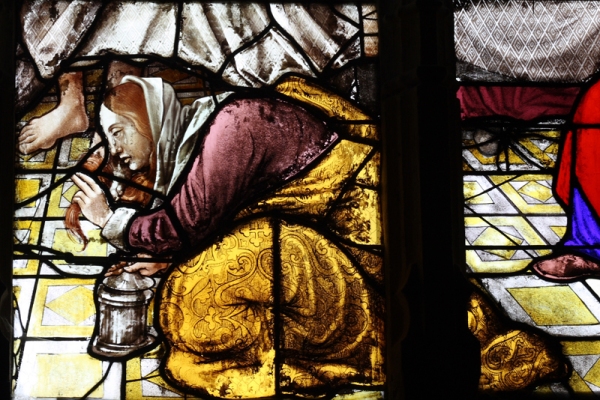
In this last week’s Lectionary reading is Luke 7:36-8:3. While Jesus was eating at a Pharisee’s house a notorious prostitute came in and begins kissing, anointing, and washing Jesus’ feet with her tears and ointment. The Pharisee, Simon, responds “If this man were a prophet, he would have known who and what kind of woman this is who is touching him—that she is a sinner.” Jesus responds with a parable about two men who owed a creditor a debt, and one of the men’s debts was ten times larger than the other. The creditor cancelled both of their debts, and Jesus asks Simon which of the men will love the creditor more. The answer, of course, is the man who owed more. And then Jesus says this brilliant line as he turns toward the woman and asks Simon: “Do you see this woman?”
Jesus is always flipping it on people who try to place people in hostile categories and under shameful labels. Simon sees this woman for her sin, while Jesus sees this woman for who she really is. And he even suggests that there is more passion for God when it comes from someone who has more sin. That completely flips how so many of us see the world.
I want to take this even further. It’s easy to have compassion on certain “sinners”—those who get caught up in destructive paths that mainly bring harm to themselves. But what we see throughout Jesus’ life is that he has compassion for both the sinners we all rally around with open arms and the ones we all push away in disgust. The passage ends by describing those who followed Jesus from town to town: a squad filled with crooked tax collectors, zealous anarchists, women who just had seven demons exorcised out of them. This was a messy bunch. Jesus literally even had the nickname “friend of sinners”. Jesus associated with all the people you would refuse to associate yourself with.
So now that we have that perspective let’s think about today. When I think of the type of sinners we push away in disgust I think of people like Brock Turner. For those that don’t know the story Brock Turner is a 20-year-old Stanford student who recently raped an unconscious woman behind a dumpster, and is only getting 3 months in jail for it. The initial outrage for the story was the way the media covered the story. Instead of showing his mugshot they showed a happy and innocent photo of him. And instead of referring to it as rape they referred to it as sexual assault. People quickly criticized the media for this since we’ve seen several times where a black man convicted of the same crime would be represented by his mugshot and the label of “rapist”. Then there was outrage at how the judge gave him such a short period of jail time: 6 months with the possibility of 3 months with good behavior. The judge was influenced by Brock Turner’s father who talked about how great of a person his son was before the incident, and how much he has been devastated with an incredible amount of guilt for his actions. The judge bought it and gave him a soft sentence, while the public went crazy and made sure everyone knew how horrible Brock Turner is; whether that was through taking away future opportunities, to countless articles written to make sure everyone remembers his crime, to groups of witches putting hexes on him.

Now, before I continue let me say that what Brock Turner did was absolutely awful and yes, evil. And yes, the way he was convicted unfairly compared to everyone else who had been in a similar position is also awful and unjust. And yet, when I read this story of Jesus accepting the most unacceptable of sinners I imagine Brock Turner in place of the sinful woman.
I imagine Brock Turner crying at Jesus’ feet as we look in disgust and say “If Jesus really knew what kind of person this guy is and what he has done then he wouldn’t let him touch him.”
This is what so many of us are doing with our merciless condemnations on this kid.
I think of people like Bill Cosby, who used to be seen as a wholesome Christian role model, and has now had his reputation ruined with dozens of rape accusations. What Bill Cosby did was disgusting and awful, but imagine him crying at Jesus’ feet. What would our reaction be?

What would our reaction be to see Omar Mateen—the man responsible for the largest mass shooting in US history at an Orlando gay nightclub—crying at Jesus’ feet?

And Jesus would turn to us and say “Do you see this person? Do you actually see them?”
Who loves Jesus more when he forgives all of our sins, the one with the least amount of sins, or the one with the most? The one who spends their life criticizing the sinner, or the sinner buried in their shameful reputation? Which one will love and cling to Jesus more when Jesus says: “Your sins are forgiven. Your faith has saved you. Go in peace.”
Personally, it’s hard for me to have that level of compassion. And it’s easy to condemn people for certain evil, especially when everyone around you from all different perspectives are ganging up together on it. I don’t think I want to be that kind of person though. Even several of my Christian friends love to gang up on the latest oppressor, but I keep finding myself less interested in siding with Christians, and more interested in siding with Jesus. And Jesus had radical compassion for everyone he met. Yes, he called them to more just and loving lives, but it began with a loving embrace of mercy and forgiveness. That’s the type of person I want to be in the world. I want to stand up for victims of all type of assault but I also want to be able to stretch our reach of grace to all sinners, even the ones who don’t deserve it. It’s painfully difficult, especially when we hear stories about Brock Turner, Bill Cosby, Omar Mateen, etc. but that’s the direction I’m trying to stretch my heart open. Perhaps a heart that wide could change things.







